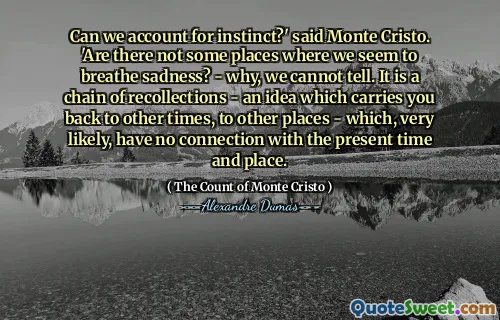You instinctively display the greatest virtue, or rather the chief defect, of us eccentric Parisians- that is, you assume the vices you have not, and conceal the virtues you possess.
In "The Count of Monte Cristo," the narrative highlights a common trait among Parisians, particularly those who are eccentric. The protagonist is described as someone who tends to exhibit faults that they do not actually possess while keeping their true virtues hidden. This observation points to the complexity of human nature and social behavior, suggesting that individuals often project a false image to the outside world.
This quote reflects the struggle between self-perception and societal expectations, emphasizing that people may hide their positive qualities while pretending to display negative ones. It reveals a poignant truth about identity and the masks we wear, encouraging readers to contemplate the difference between external appearances and internal realities.






